Cva classifications - Study guides, Class notes & Summaries
Looking for the best study guides, study notes and summaries about Cva classifications? On this page you'll find 130 study documents about Cva classifications.
Page 3 out of 130 results
Sort by
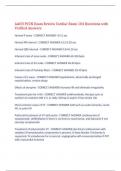
-
AACN PCCN Exam Review Cardiac Exam 104 Questions with Verified Answers,100% CORRECT
- Exam (elaborations) • 12 pages • 2024
- Available in package deal
-
- $11.49
- + learn more
AACN PCCN Exam Review Cardiac Exam 104 Questions with Verified Answers Normal P wave - CORRECT ANSWER <0.11 sec Normal PR interval - CORRECT ANSWER 0.12-0.20 sec Normal QRS interval - CORRECT ANSWER 0.04-0.10 sec Inherent rate of sinus node - CORRECT ANSWER 60-100 bpm Inherent rate of AV node - CORRECT ANSWER 40-60 bpm Inherent rate of Purkinje fibers - CORRECT ANSWER 20-40 bpm Causes of U wave - CORRECT ANSWER hypokalemia, abnormally prolonged repolarization, various dru...
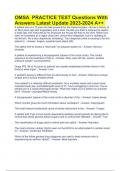
-
OMSA Exam Practice Questions With Answers Latest Update 2023-2024 | 100% Verified
- Exam (elaborations) • 8 pages • 2023
- Available in package deal
-
- $13.49
- + learn more
OMSA Exam Practice Questions With Answers Latest Update 2023-2024 | 100% Verified. A pediatric airway is different than an adult airway in that: - Answer- Kids have a larger tongue and a conical shaped airway Your patient is a relatively difficult anesthetic: he is morbidly obese with a short neck, recessed lower jaw, and Mallampatti score of VI. You're struggling to chin him. You've already put in a nasal pharyngeal airway. What else might you try before you intubate him? - Answer- Laryn...
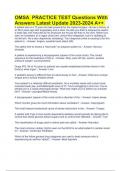
-
OMSA PRACTICE TEST Questions With Answers Latest Update 2023-2024 A++
- Exam (elaborations) • 8 pages • 2023
- Available in package deal
-
- $13.49
- + learn more
OMSA PRACTICE TEST Questions With Answers Latest Update 2023-2024 A++. A patient who is a 72 year old male presents for his implant surgery. He has a history of an MI 6 years ago with angioplasty and a stent. He tells you that he stopped his aspirin a week ago (not instructed by his physician but he just did that on his own). Before you start, he complains of a vague chest pain, almost like indigestion, but it is radiating to his left arm. He is also diaphoretic (sweating). Your diagnosis (w...
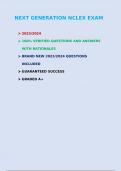
-
NEXT GENERATION NCLEX EXAM BRAND NEW 2023-2024 QUESTIONS INCLUDED
- Exam (elaborations) • 45 pages • 2023
- Available in package deal
-
- $18.99
- + learn more
NEXT GENERATION NCLEX (NGN) EXAM Which of the following is the primary purpose of using an incentive spirometer postoperatively? A. To improve lung function and prevent atelectasis B. To decrease blood pressure and heart rate C. To reduce the risk of thrombosis D. To increase urinary output Answer: A Multiple-response question: Which of the following are potential signs and symptoms of hypoglycemia? (Select all that apply) A. Shakiness B. Confusion C. Sweating D. Polyuria E. Rapid he...
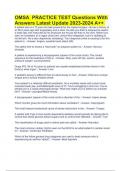
-
OMSA TEST Questions With Answers Latest Update 2023-2024 (Graded A+)
- Exam (elaborations) • 8 pages • 2023
- Available in package deal
-
- $14.99
- + learn more
OMSA TEST Questions With Answers Latest Update 2023-2024 (Graded A+). A patient is experiencing a laryngospasm (spasm of the vocal cords). The correct sequence for the treatment of this is: - Answer- Stop, pack off site, suction, positive pressure oxygen, succinylcholine Drugs (PO, IM or IV) given to patients are usually metabolized (broken down) in the body by what organ: - Answer- Liver A pediatric airway is different than an adult airway in that: - Answer- Kids have a larger tongue and ...
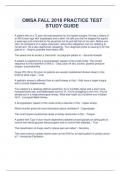
-
OMSA FALL 2018 PRACTICE TEST STUDY GUIDE
- Exam (elaborations) • 8 pages • 2023
-
- $11.99
- + learn more
A patient who is a 72 year old male presents for his implant surgery. He has a history of an MI 6 years ago with angioplasty and a stent. He tells you that he stopped his aspirin a week ago (not instructed by his physician but he just did that on his own). Before you start, he complains of a vague chest pain, almost like indigestion, but it is radiating to his left arm. He is also diaphoretic (sweating). Your diagnosis (what is causing it) for this patient is: - Angina, possible heart attack (MI...
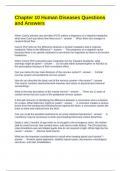
-
Chapter 10 Human Diseases Questions and Answers
- Exam (elaborations) • 4 pages • 2024
- Available in package deal
-
- $12.99
- + learn more
Chapter 10 Human Diseases Questions and Answers When Carol's primary care provider (PCP) makes a diagnosis of a migraine headache, what does Carol say about how they occur? When there are changes in cerebral blood flow Carol's PCP tells her the difference between a tension headache and a migraine headache. What is the difference? The prognosis of a migraine varies because there is no specific treatment or prevention for migraines as there is for tension headaches Previou...
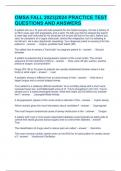
-
OMSA FALL 2023|2024 PRACTICE TEST QUESTIONS AND ANSWERS
- Exam (elaborations) • 8 pages • 2023
- Available in package deal
-
- $18.99
- + learn more
OMSA FALL 2023|2024 PRACTICE TEST QUESTIONS AND ANSWERS A patient who is a 72 year old male presents for his implant surgery. He has a history of an MI 6 years ago with angioplasty and a stent. He tells you that he stopped his aspirin a week ago (not instructed by his physician but he just did that on his own). Before you start, he complains of a vague chest pain, almost like indigestion, but it is radiating to his left arm. He is also diaphoretic (sweating). Your diagnosis (what is causing it...
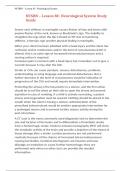
-
NCSBN – Lesson 8C: Neurological System Study Guide,100% CORRECT
- Exam (elaborations) • 97 pages • 2023
- Available in package deal
-
- $15.49
- + learn more
NCSBN – Lesson 8C: Neurological System Study Guide Severe neck stiffness in meningitis causes flexion of hips and knees with passive flexion of the neck, known as Brudzinski's sign. The inability to straighten the legs when the hip is flexed to 90° due to hamstring stiffness, is Kernig's sign another physical finding in meningitis. When your client has been admitted with a head injury and the client has confusion and/or restlessness and/or the level of consciousness (LOC) is altered, th...
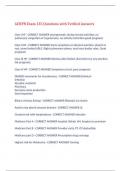
-
ACHPN Exam 135 Questions with Verified Answers,100% CORRECT
- Exam (elaborations) • 14 pages • 2023
-
- $11.49
- + learn more
ACHPN Exam 135 Questions with Verified Answers Class I HF - CORRECT ANSWER asymptomatic during normal activities, no pulmonary congestion or hypotension, no activity restriction-good prognosis Class II HF - CORRECT ANSWER Some symptoms on physical exertion, absent at rest, some limited ADLS. Slight pulmonary edema, may have basilar rales. Good prognosis Class III HF - CORRECT ANSWER Obvious ADL limited, discomfort on any exertion, fair prognosis. Class IV HF - CORRECT ANSWER Sympto...

Study stress? For sellers on Stuvia, these are actually golden times. KA-CHING! Earn from your study resources too and start uploading now. Discover all about earning on Stuvia


